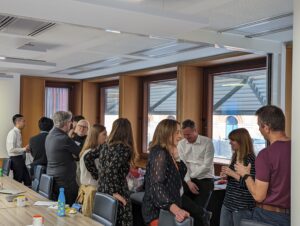Last week Anya, together with Michelle Morris from University of Leeds, hosted an inaugural meeting of the Turing Special Interest Group on Novel data Linkages for Health and Wellbeing. It was great to see many familiar faces, and meet new colleagues from across disciplines in academia, industry, government and third sector. The event on the 26th of October 2022 was joined by about 40 people, both in person – at the Alan Turing Institute – and online. It wouldn’t have been possible without support from five Early Career Researchers – Lizzie Dolan (University of Nottingham), Fran Pontin (University of Leeds); Vicki Jenneson (University of Leeds); Torty Sivill (University of Bristol/Alan Turing Institute) and Neo Poon (University of Bristol) – who all helped to organise, take notes and run the discussion groups.

The SIG was founded by Michelle and Anya and its idea first floated over a year ago. The main goal of the group is to create a forum and a platform to bring multi discipline and multi sector communities together in order to exchange ideas, network and develop projects in the booming area of research with novel digital footprint data.
The day started with a presentation from Bruce Jackson, ESRC/UKRI about a newly funded multimillion ESRC DigitalFootprint programme which aims to coordinate and support interdisciplinary research with digital footprint data. In the end of his talk, Bruce used the opportunity to pose questions about the role of funders in supporting data linkages with digital footprint data to the community. These questions are a great starting point for further discussions in our SIG’s meetings.
The next item on agenda was a panel discussion chaired by Michelle Morris on what are the opportunities and pitfalls for novel data linkages in the area of health and wellbeing. The panelists included Helen Della Nave, a lead of the We The Curious Public Engagement with Research programme; Adam Steventon, Director of Data Platforms at Our Future Health; Tim Rains, a Senior Geospatial Analyst working at British Telecom and Mark Birkin, Professor of Spatial Analysis and Policy in the School of Geography, University of Leeds. Each panelist brought their own unique perspective on the question, resulting in a fascinating discussion.
Helen discussed public engagement work at WTC on using a form of digital footprints – shopping data – for public health research. Helen also provided poignant quotes from exhibition attendees expressing their thoughts on the value of shopping data for public good and whether they would be willing to donate their own data for research. Adam provided a personal perspective of how powerful the use of digital footprint data can be for the public, as it goes beyond what is collected through the health system, as well as how this can extend to large studies like Our Future Health. Tim talked about his experience of working with shopping and other forms of digital footprint data from an industry point of view, while Mark highlighted the research and policy landscape where digital footprint data fits, including how it aligns with the new strategic direction of the Alan Turing Institute.
The day concluded with break out groups – three in person and one online – which focused on the future of the SIG, key issues and an agenda to take forward. The event produced a lot of enthusiastic discussions and debates, and ideas for future meetings and workshops. A summary report of the main points and questions, along with the plan for future SIG’s actions will follow in December 2022.
The SIG is open to anybody working in the field of novel data or novel data linkages, so if you are interested to join the mailing list for the updates from the SIG, please sign up here. For any questions about the group please contact Anya.
By Anya Skatova